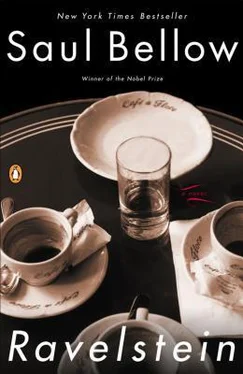I was familiar now with Ravelstein's ideas on marriage. People are beaten at last with their solitary longings and intolerable isolation. They need the right, the missing portion to complete themselves, and since they can't realistically hope to find that they must accept a companionable substitute. Recognizing that they can't win, they settle. The marriage of true minds seldom occurs. Love that bears it out even to the edge of doom is not a modern project. But there was, for Ravelstein, nothing to compete with this achievement of the soul. Scholars deny that Sonnet 116 is about the love of men and women but insist that Shakespeare is writing about friendship. The best we can hope for in modernity is not love but a sexual attachment-a bourgeois solution, in bohemian dress. I mention bohemianism because we need to feel that we are liberated. Ravelstein taught that in the modern condition we are in a weak state. The strong state-and this was what he learned from Socrates-comes to us through nature. At the core of the soul is Eros. Eros is overwhelmingly attracted to the sun. I've probably spoken of this before. If I speak of it again it's because I am never done with Ravelstein and he was never done with Socrates, for whom Eros was at the center of the soul, where the sun nourishes and expands it.
But in some respects I thought better of Vela than Ravelstein did. He was not vulnerable to her sort of charm. I on the other hand continued to see what others saw in her-crossing a room, dressed very expensively, so rapidly planting her toes that her heels hardly ever touched the ground. She had original notions about walking, talking, shrugging, smiling. American acquaintances thought that she was the soul of European gracefulness and elegance. Rosamund herself thought so. I explained that under it all there was really a special kind of attractive clumsiness. But all the prestige, her reputation in her branch of physics, the fat salary she was paid, her inimitable toppling glamour, were too hard for any woman to compete with. Rosamund would say, "What an unusually beautiful woman she is-waist, legs and everything."
"True. But there's a hint of artificiality about it. Like a stratagem. Like a lack of affect."
"Even after such a long marriage?"
I had hoped to make it work with Vela because I had had earlier marriages. But I had more or less given up the fight and for a dozen years or so had made no claims on Vela. In the morning she would slam out of the house and I would turn to my tasks and spend my days at them. Ravelstein, from the other side of the city, checked in on the telephone for an hour or two. At least once a week Rosamund came by public transportation from Ravelstein's end of town. I often suggested that she hire a cab but she said that she preferred the El train. Rosamund said that George, her fiancй, thought the El was perfectly safe. The Transit Authority policed them more effectively here than in New York.
Picking up Ravelstein's habit I taught her the term _louche__-dubious. Nothing like a French word to neutralize an American danger.
Everything just then was going from bad to worse. I had come back after the funeral of my brother in Tallahassee in time to see my surviving brother, Shimon, on what turned out to be the last day of his life. He said to me, "You're wearing a beautiful shirt, Chick-that's got class, the red-and-gray stripe."
We were sitting together on the rattan sofa. His cancer-wasted face wore the usual pert look of good humor.
"But I hear you want to buy a diesel Mercedes. I advise you not to do it," he said. "It'll be nothing but trouble." He was vibrating with the final urgency or restlessness. It was all but over now, so I promised not to buy the diesel. Then he said, after a long exchange of silent looks, that he wanted to climb back into bed. He was too far gone to do this. He had been a ball player once with strong legs, but the muscle now was all gone. I watched from behind, trying to decide whether to intervene. He had nothing left to do his will with. And then his head twisted toward me and his eyeballs turned up-nothing but blind whites. The nurse cried out, "He's leaving us."
Shimon raised his voice and said, "Don't get excited."
This was what he said often to his wife and to his children when they differed or began to quarrel. Not to let things get out of hand was his function in the family. He was unaware that his eyeballs had rolled back into his head. But I had seen this in the dying and knew that he was leaving us-the nurse was right.
After his funeral in the very same week, a few days before my birthday, I was loud and angry, kicking at Vela's bathroom door when I remembered my brother's call for calm, very nearly the last thing he had said. So I left the house. When I came back that night I found a note from Vela; she was sleeping over with Yelena, another Balkan-French woman.
Coming home again the following night I found the house filled with large, colored stickum circles-the green identified my pos sessions, the salmon-colored were glued to hers. The apartment swirled with these large dots. Their colors were abnormal, something gassy or bilious about them; they were identified on the box they came in as "pastel shades." They produced a snowstorm effect-"a meum-tuum blizzard," as I said to Ravelstein.
A team of his students helped me to unpack in the new apartment after I had moved. Rosamund was among them. She was naturally interested in the books I had collected. In the movers' boxes were my college Wordsworth and my Shakespeare and Company _Ulysses__ with the curious errors made by Joyce's Parisian typesetters-not "give us a touch, Poldy. God, I'm dying for it," but "give us a tough," says Molly. All because two dogs are copulating in the street below. "How life begins," thinks Leopold Bloom. On this day he and Molly conceive their son, a child who does not live long. In every direction, the walls of life are tiled with such facts so that you can never account for them all, only note some of the more conspicuous ones. For instance, what Vela must have looked like when she plastered all those objects with pale green and orange stickum dots. To look at them would make you run out screaming. So why does one marry a woman whose final act as a wife is to apply hundreds if not thousands of labels? For that matter, why did Molly marry Leopold Bloom? Her answer was "Well as well him as another."
I had thought of Vela as a beauty impossible to rival. She had worn her skirts tightly tailored on the backsides. She had cavalry cruppers, together with a very fine bust, and the knocking of her heels when she entered a room were like military drums but gave you no clue to what she was feeling or thinking.
Vela had a stiff upper lip. I have always been inclined to give a special diagnostic importance to the upper lip. If there is a despotic tendency it will reveal itself there. When I examine a photograph it is my habit to isolate features. What does this forehead tell you, or the placement of those eyes? Or that mustache? Hitler and Stalin, the classic dictators of our century, wore very different mustaches. Hitler's lip, come to think of it, was extremely conspicuous. A curious fact: Vela's lip stung you when you kissed her.
She had a way of leading you, of showing you how to be a male. This tendency is more common among women than you might suppose. Either she had in mind men she had liked in the past, or she had some male principle of her own to follow, a Jungian masculine counterpart, her particular animus or inborn vision of a man-unconscious, of course.
Ravelstein had no patience for such stuff. He said, "This Jungian shtick comes straight from Radu Grielescu. Vela is a great pal of the Grielescu couple. You used to have dinner with them every other week. Of course you're a writer, you need to meet all kinds of people," said Ravelstein. "That's only natural for a man in your position. People from the sports world, from the movies, musicians, commodity brokers, criminals, too. They're your bread and butter, meat and potatoes."
Читать дальше












